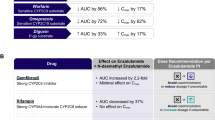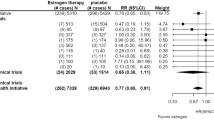Abstract
Cancer cachexia is highly prevalent in patients with advanced cancer. Its main clinical manifestation is profound anorexia. Progestational drugs have shown meaningful effects on appetite, food intake, and nutritional status in patients with advanced cancer and AIDS, and could be useful in managing anorexia. Corticosteroids also seem to produce increased appetite, but these effects are short-lived. Cyproheptadine, hydrazine sulfate, and cannabinoids also are being studied in the management of cancer-induced anorexia, but their role has not yet been clearly established. Future research should evaluate how the different drugs affect specific symptoms associated with cachexia.
Similar content being viewed by others
References
Aisner J, Parnes H, Tait N, et al (1990) Appetite stimulation and weight gain with megestrol acetate. Semin Oncol 17 [Suppl 9]:2–7
Blackburn G, Miller M, Bothe A (1985) Nutritional factors in cancer in medical oncology. In: Calabresi P, Schein P (eds) Oncology. MacMillan, New York, pp 1406–1432
Brennan M (1985) Nutritional support. In: De Vita VT, Hellman S, Roenberg SA (eds) Cancer principles and practice of oncology. Lippincott, Philadelphia, pp 1907–1920
Bruera E, MacDonald RN (1988) Nutrition in patients with advanced cancer: an update and review of our experience. J Pain Symptom Manage 3:133–140
Bruera E, Roca E, Cedaro L, et al (1985) Action of oral methylprednisolone in terminal cancer patients: a prospective randomized double-blind study. Cancer Treat Rep 69:751–754
Bruera E, Macmillan K, Kuehn N, et al (1990) A controlled trial of megestrol acetate on appetite, caloric intake, nutritional status, and other symptoms in patients with advanced cancer. Cancer 66:1279–1282
Bruera E, Legris MA, Kuehn N, Miller MJ (1990) Hypodermoclysis for the administration of fluids and narcotic analgesics in patients with advanced cancer. J Pain Symptom Manage 5: 218–220
Bruera E, Macmillan K, Hanson J, Kuehn N, MacDonald RN (1990) A controlled trial of megestrol acetate on appetite, caloric intake, nutritional status, and other symptoms in patients with advanced cancer. Cancer 66: 1279–1282
Burt M, Gorschboth C, Brennan M (1982) A controlled prospective, randomized trial evaluating the metabolic effects of enteral and parenteral nutrition in the cancer patient. Cancer 49:1092–1105
Cavalli F, Goldhirsch A, Jungi F, et al (1984) Randomized trial of low versus high dose medroxyprogesterone acetate in the treatment of post-menopausal patients with advanced breast cancer. In: Pellegrini A, Robustelli G (eds) Role of medroxyprogesterone in endocrine-related tumors. Raven Press, New York, pp 79–90
Chlebowski RT, Bulcavage L, Grosvenor M, et al (1987) Hydrazine sulfalte in cancer patients with weight loss: a placebo controlled clinical experience. Cancer 59:406–410
Chlebowski RT, Bulcavage L, Grosvenor M, et al (1990) Hydrazine sulfate influence on nutritional status and survival in non-small cell lung cancer. J Clin Oncol 8: 9–15
Cruz JM, Mus HB, Brockschmidt JK, et al (1990) Weight changes in women with metastatic breast cancer treated with megestrol acetate: a comparison of standard versus high dose therapy. Semin Oncol 17 [Suppl 9]:63–67
Derogatis L, MacDonald R (1982) Psychopharmacologic applications to cancer. Cancer 50:1968–1973
Detsky AS, Baker JP, O'Rourke K, Goel V (1987) Peroperative parenteral nutrition: a meta-analysis. Ann Intern Med 107:195–203
DeWys WD, Begg C, Lavin PT, et al (1980) Prognostic effect of weight loss prior to chemotherapy in cancer patients. Am J Med 69:491–497
Editorial (1978) Cyproheptadine. Lancet I:368
Evans W, Nixon D, Daly J (1986) A randomized study of standard or augmented oral nutritional support versus ad lib nutrition intake in patients with advanced cancer (abstract). Clin Invest Med 9:A-127
Gershanovich ML, Danova LA, Ivan BA, et al (1981) Results of clinical study of antitumor action of hydrazine sulfate. Nutr Cancer 3:7–12
Gold J (1975) Use of hydrazine sulfate in terminal and preterminal cancer patients: results of investigation of new drug (IND) study in 84 evaluable patients. Oncology 32:1–10
Haynes R, Murad F (1980) Adrenocorticotropic hormone, adrenocortical steroids and their synthetic analogs. In: Goodman L Gilman A (eds) Pharmacological basis of therapeutics. McMillan, New York, pp 1466–1496
Hughes TK, Cadet P, Larned CS (1989) Modulation of tumor necrosis factor activities by potential anticachexia compound hydrazine sulfate. Int J Immunopharmacol 11:501–507
Issell B, Valdivieso M, Haren A, et al (1978) Protection against chemotherapy toxicity in IV hyperalimentation. Cancer Treat Rep 62:1139–1143
Kardinal C, Loprinzi C, Shaw P, et al (1980) A controlled trial of cyproheptadine in cancer patients with anorexia. Cancer 65:2657–2662
Koretz R (1984) Parenteral nutrition: is it oncologically logical? J Clin Oncol 2:534–538
Lener HJ, Regelson W (1976) Clinical trial of hydrazine sulfate in solid tumors. Cancer Treat Rep 60:959–960
Loprinzi CL, Ellison NM, Schaidd J, et al (1990) A controlled trial of megestrol acetate treatment of cancer anorexia and cachexia. J Natl Cancer Inst 82:1127–1132
Loprinzi C, Ellison NM, Goldberg RN (1990) Alleviation of cancer anorexia and cachexia. Studies of the Mayo Clinic and the North Central Cancer Treatment Group. Semin Oncol 17 [Suppl 9]:8–12
Moertel C, Shutte A, Reitemeier R, et al (1974) Corticosteroid therapy of preterminal gastrointestinal cancer. Cancer 33:1607–1609
Montastruc JL, Chamontin B, Senard JL, et al (1985) Domperidone in the management of oathostatic hypotension. Clin Neuropharmacol 8:191–192
Müller JM, Brenner U, Dienst C, Pichlmaier H (1982) Preoperative parenteral feeding in patients with gastrointestinal carcinoma. Lancet I:68–71
Nobel R (1989) Effect of cyproheptadine on appetite and weight gain in adults. JAMA 209:2054–2055
Ocho AM, Wittes RE, Krakoff RH (1975) Trial of hydrazine sulfate (NSC-150014) in patients with cancer. Cancer Chemother Rep 59:1151–1154
Pawlowski GJ (1975) Cyproheptadine: weight-gain and appetite stimulation in essential anorexic adults. Curr Ther Res Clin Exp 18:673–678
Pommatau E, Revillard J, Gignous M (1962) Intérêt de methyl-6-prednisolone hémisuccinate de sodium (Solumedrol) dans les traitements des tumeurs malignes. Lyon Med 49:1179–1198
Popiela T, Lucchi R, Giongo F (1989) Methylprednisolone as palliative therapy for female terminal cancer patients. Eur J Cancer Clin Oncol 25:1823–1829
Randall H (1984) Enteral nutrition: tube feeding in acute and chronic illness. J Enteral Parenteral Nutr 8:113–134
Ray PD, Hanson RL, Lardy HA (1970) Inhibition by hydrazine of gluconeogenesis in the rat. J Biol Chem 5:690–696
Robustelli Della Cuna G, Pellegrini A, Piazzi M (1989) Effect of methylprednisolone sodium succinate on quality of life in pre-terminal cancer patients: a placebo controlled, multi-center study. Eur J Cancer Clin Oncol 25:1817–1821
Schell H (1972) Adrenal corticosteroid therapy in far-advanced cancer. Geriatrics 27:131–141
Schulze-Delriev K (1981) Metoclopramide. N Engl J Med 305:28–32
Shah N (1968) A double blind study on appetite stimulation and weight gain with cyproheptadine as adjunct to specific therapy in pulmonary tuberculosis. Curr Med Pract 12:861–864
Silverstein R, Bhatia P, Svoboda DS (1989) Effect of hydrazine sulfate on glucose-regulating enzymes in the normal and cancerous rat. Immunopharmacology 17:37–43
Silverstein R, Christofferson CA, Morrison DC (1989) Modulation of endotoxinlethality in mice by hydrazine sulfate. Infect Immun 57:2072–2078
Smale B, Mullen J, Buzby G, et al (1981) The efficacy of nutritional assessment and support in cancer surgery. Cancer 47:2375–2381
Spremulli E, Wampler GL, Regelson W (1979) Clinical study of hydrazine sulfate in advanced cancer patients. Cancer Chemother Pharmacol 3:121–124
Tayek JA, Heber D, Chlebowski RT (1987) Effective hydrazine sulfate on whole body protein breakdown measured by 14C-lysine metabolism in lung cancer patients. Lancet II:241–244
Tchekmedyian S, Tait N, Moody M, et al (1986) Appetite stimulation with megestrol acetate in cachectic cancer patients. Semin Oncol 13:37–43
Tchekmedyian S, Tait N, Moody M, et al (1987) High dose megestrol acetate: a possible treatment for cachexia. JAMA 257:1195–1199
Tchekmedyian NS, Hariri L, Siau J, et al (1990) Megestrol acetate in cancer anorexia and weight loss (abstract). Proc Am Soc Clin Oncol 9:336
Torosian M, Daly J (1986) Nutritional support in the cancerbearing host. Cancer 58:1915–1929
Twycross RG (1979) Continuing in terminal care: an overview in advances in pain research and therapy. In: Bonica J, Ventafridda V (eds) Proceedings of the International Symposium on Pain of Advanced Cancer, vol 2. Raven Press, New York, pp 617–634
Von Roenn JH, Murphy RL, Wegener N (1990) Megestrol acetate for treatment of anorexia and cachexia associated with human immunodeficiency virus infection. Semin Oncol 17 [Suppl 9]:13–16
Wadleigh R, Spaulding GM, Lumbersky B, et al (1990) Dronabinol enhancement of appetite and cancer patients (abstract). Proc Am Soc Oncol 9:331
Warren S (1932) The immediate cause of death in cancer. Am J Med Sci 184:610–613
Willox J, Corr J, Shaw J, et al (1984) Prednisolone as an appetite stimulant in patients with cancer. BMJ 200:37
Author information
Authors and Affiliations
Rights and permissions
About this article
Cite this article
Bruera, E. Is the pharmacological treatment of cancer cachexia possible?. Support Care Cancer 1, 298–304 (1993). https://doi.org/10.1007/BF00364967
Issue Date:
DOI: https://doi.org/10.1007/BF00364967




